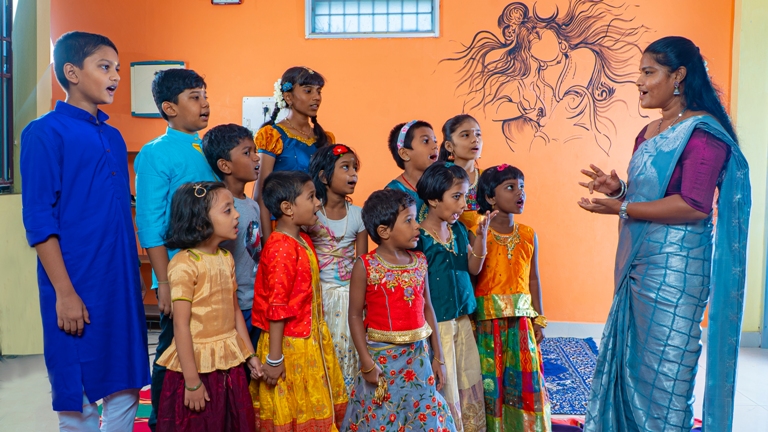In our Yazh Academy, we offer Carnatic Vocal classes, a classical South Indian vocal music tradition. Our experienced vocal instructors teach students the melodic intricacies, rhythmic patterns, and emotive aspects of Carnatic music. Students learn to sing in different scales (ragas) and rhythmic cycles (talas). We focus on developing voice control, breath control, and clarity of pronunciation. Students also learn to interpret and express the lyrics (sahitya) of Carnatic compositions. Through personalized instruction and regular practice, we aim to cultivate a strong foundation in Carnatic vocal music, fostering a deep appreciation for its rich heritage and encouraging students to explore their artistic expression through singing.

About Carnatic Vocal:
Carnatic vocal is a major tradition of classical music from South India. It is one of the two main sub-genres of Indian classical music, the other being Hindustani music from North India. Here’s an overview:
1. Origins and History: Carnatic music traces its origins to ancient musical concepts and treatises, most notably the Natya Shastra. The foundational aspects of Carnatic music were codified in the 16th and 17th centuries by the trinity of Carnatic music: Tyagaraja, Muthuswami Dikshitar, and Syama Sastri.
2. Ragas: At the heart of Carnatic music is the concept of raga, a melodic framework for improvisation and composition. Each raga evokes specific emotions and sentiments.
3. Tala: Talas are rhythmic cycles in Carnatic music. Every composition is set to a particular tala that dictates its rhythm.
4. Compositions: Carnatic music has a rich array of compositions such as Kritis, Varnams, Alapanas, and Thillanas, among others. These compositions are sung in various South Indian languages, primarily Telugu, Tamil, Sanskrit, and Kannada.
5. Improvisation: A significant part of a Carnatic vocal performance is improvisation. Artists showcase their expertise by improvising within the framework of the chosen raga. “Manodharma sangeetham” is the term used to describe the improvisational elements in Carnatic music.
6. Voice and Technique: Carnatic vocalists use various techniques to produce a wide range of sounds and emotions. Gamakas, or ornamental shakes, are an essential aspect, lending a unique flavor to this musical tradition.
7. Accompaniments: Vocal performances are usually accompanied by instruments such as the violin (for melodic accompaniment), the mridangam (a type of drum for rhythmic accompaniment), and often the ghatam, kanjira, and the tambura which provides a drone in the background.
8. Learning and Pedagogy: Carnatic vocal is traditionally imparted through the Guru-Shishya (teacher-student) parampara. Students usually begin with basic vocal exercises called “Sarali Varisai” and move on to more complex exercises and compositions as they advance.
9. Festivals and Concerts: The December Music Season in Chennai, India, is one of the world’s largest cultural events focused on Carnatic music, attracting performers and fans from all over the globe.
10. Modern Influences: Today, Carnatic vocal has crossed its traditional boundaries with many artists collaborating across genres and cultures, infusing elements of jazz, pop, and other music forms, yet retaining its classical core.
In essence, Carnatic vocal music is a profound and intricate system that emphasizes both technical prowess and emotive expression, encapsulating the rich cultural and spiritual heritage of South India.
For Enquiry Offline or Online Classes
Google Reviews
 Durka Devi2023-09-02It's a best academy to learn music in a friendly manner. The teachers are well qualified.
Durka Devi2023-09-02It's a best academy to learn music in a friendly manner. The teachers are well qualified. jothi thomas2023-08-01My son is learning keyboard and my daughter is learning drawing in Yazh academy for 3 years the way the teach is really good and the master is really friendly and kind.
jothi thomas2023-08-01My son is learning keyboard and my daughter is learning drawing in Yazh academy for 3 years the way the teach is really good and the master is really friendly and kind. Ramesh Kumar2023-08-01My Kids are learning music in good atmosphere...
Ramesh Kumar2023-08-01My Kids are learning music in good atmosphere... G Mahalakshmi2023-07-31It is a great place to learn music. Giving chance to each student for improving their individual talent.
G Mahalakshmi2023-07-31It is a great place to learn music. Giving chance to each student for improving their individual talent. Pavithra Srinivasan2023-07-31Lovely team who are very much interested in developing the talent of the children. Happy to be here
Pavithra Srinivasan2023-07-31Lovely team who are very much interested in developing the talent of the children. Happy to be here udhayakumar vedagiri2023-07-31Thanks for moulding kids to be masters in music & finearts
udhayakumar vedagiri2023-07-31Thanks for moulding kids to be masters in music & finearts Annapoorni Gubendra Gupta2023-07-31Good place to learn and excellent staffs...really great !!!Google rating score: 4.9 of 5, based on 107 reviews
Annapoorni Gubendra Gupta2023-07-31Good place to learn and excellent staffs...really great !!!Google rating score: 4.9 of 5, based on 107 reviews

